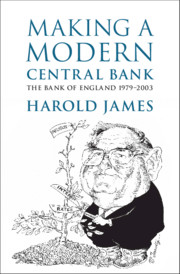Book contents
- Making a Modern Central Bank
- Studies in Macroeconomic History
- Making a Modern Central Bank
- Copyright page
- Dedication
- Contents
- Figures
- Tables
- Acknowledgements
- Abbreviations
- 1 Introductory
- 2 Foreign Fetters
- 3 The Performance of the UK Economy
- 4 The Inexplicable in Pursuit of the Uncontrollable
- 5 ‘A Good Deal of Advice’
- 6 The Long Shadow of the Deutschemark
- 7 Hong Kong
- 8 Shaved Eyebrows
- 9 Tunnelling Deep
- 10 Great Leap in the Dark
- 11 The Spine Theory and Its Collapse
- 12 ‘You Can’t Be In and Out at the Same Time’:
- 13 Horses for Courses
- 14 Failure of Internal Communication
- 15 The New Bank
- 16 Epilogue
- Book part
- Notes
- Bibliography
- Index
10 - Great Leap in the Dark
The Bank, the Delors Committee and the Euro
Published online by Cambridge University Press: 18 September 2020
- Making a Modern Central Bank
- Studies in Macroeconomic History
- Making a Modern Central Bank
- Copyright page
- Dedication
- Contents
- Figures
- Tables
- Acknowledgements
- Abbreviations
- 1 Introductory
- 2 Foreign Fetters
- 3 The Performance of the UK Economy
- 4 The Inexplicable in Pursuit of the Uncontrollable
- 5 ‘A Good Deal of Advice’
- 6 The Long Shadow of the Deutschemark
- 7 Hong Kong
- 8 Shaved Eyebrows
- 9 Tunnelling Deep
- 10 Great Leap in the Dark
- 11 The Spine Theory and Its Collapse
- 12 ‘You Can’t Be In and Out at the Same Time’:
- 13 Horses for Courses
- 14 Failure of Internal Communication
- 15 The New Bank
- 16 Epilogue
- Book part
- Notes
- Bibliography
- Index
Summary
The Governor of the Bank of England, Robin Leigh-Pemberton, played a surprisingly prominent role in the drafting of the Delors Report 1988–1989, a report that laid down a blueprint for a three stage move to European Monetary Union. The Treasury was very sceptical of the plan, and Margaret Thatcher was appalled: she never forgave Leigh-Pemberton for what she saw as a betrayal. Leigh-Pemberton pressed for a premature conclusion of the Delors Committee meetings and the publication of the report in April 1989 because he feared that a Financial Times leak of the draft would make his position unsustainable in face of the Prime Minister’s opposition. There is a large measure of irony in the way in which the Governor of the Bank of England became a key architect of the single European currency, the Euro.
- Type
- Chapter
- Information
- Making a Modern Central BankThe Bank of England 1979–2003, pp. 255 - 266Publisher: Cambridge University PressPrint publication year: 2020

